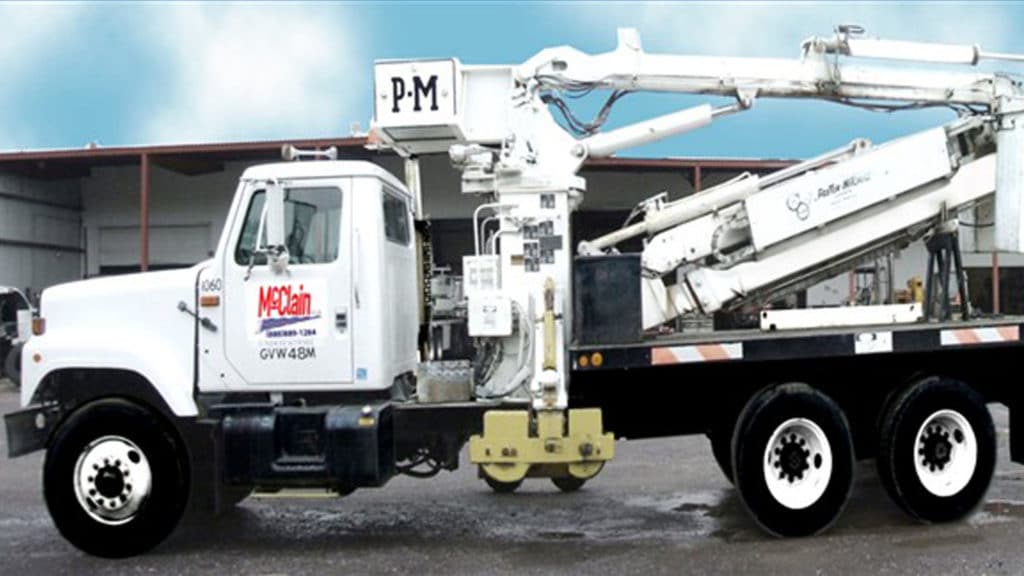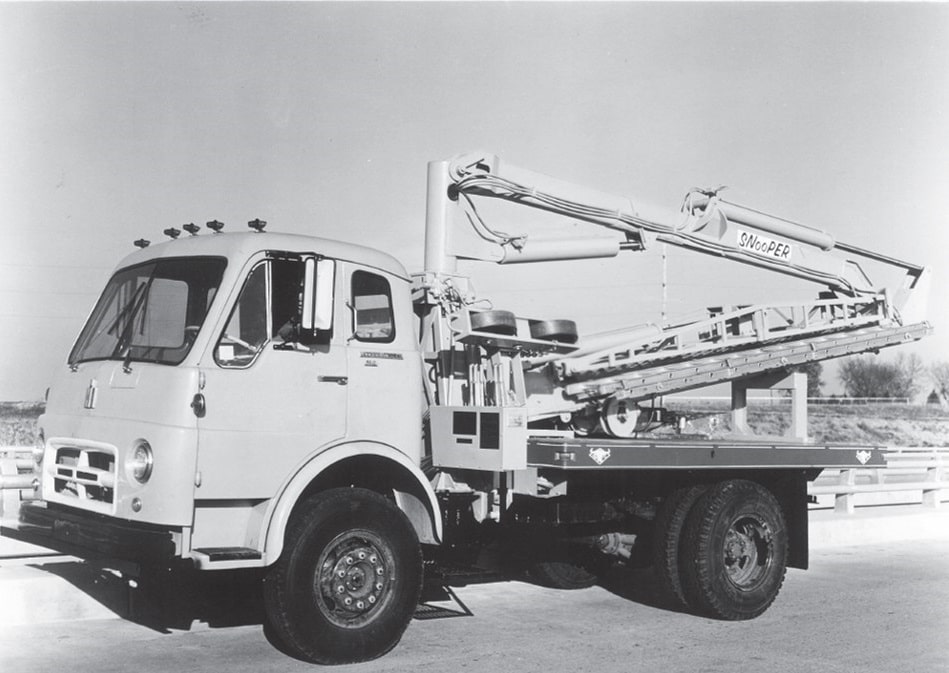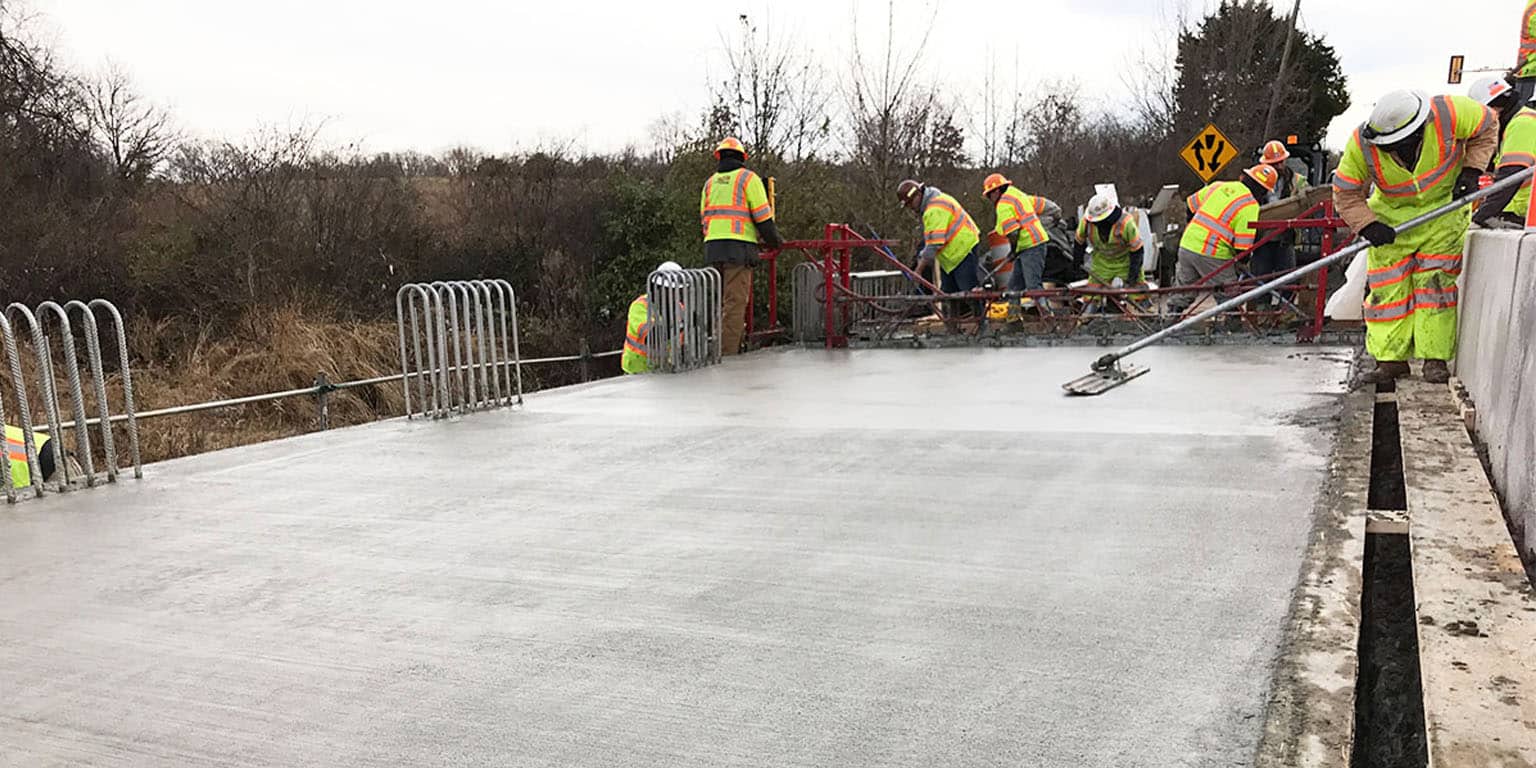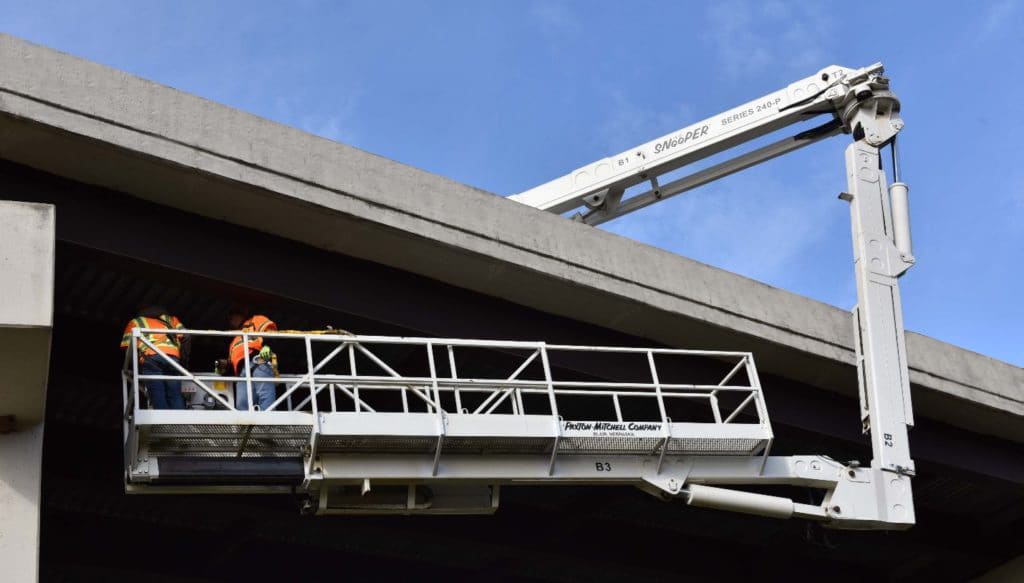There are several methods for gaining under bridge access for bridge inspections. And, until the advent of the so-called snooper truck or under bridge access vehicle, these methods were somewhat tedious, inherently risky, and time-consuming.
Today, thanks in large part to the introduction of the Paxton-Mitchell under bridge inspection and maintenance truck almost 60 years ago, bridge inspectors and maintenance crews across the country have benefited from the advantages of mobile under bridge inspection equipment.
Only a SNOOPER™ is a Snooper Truck – All the Rest are Bridge Inspection Equipment
At McClain and Company, we offer a wide range of high-quality and reliable under bridge and aerial access equipment rentals, including several SNOOPER™ trucks.
However, we are particularly fond and somewhat protective of the SNOOPER™ brand. While we understand that it was because of the overwhelming popularity of those early SNOOPER™ trucks that caused them to become a “household” name in the industry, we also know that it there is only one genuine “snooper truck,” and that’s the trademarked SNOOPER™.
So, regardless of whether you choose to rent an Aspen Aerials under bridge inspection truck, a MOOG truck unit, or a genuine SNOOPER™ for your next bridge inspection project, your inspection work will go faster, easier, safer, and more efficiently.
And that’s because of the significant and numerous advantages of using mobile under bridge inspection equipment.

Four Reasons Why Mobile Under Bridge Inspection Equipment is a Better Option
It’s not an exaggeration to say that mobile under bridge inspection equipment, such as snooper trucks, have revolutionized highway bridge inspections. Because they offer several advantages over traditional inspection methods, they have become increasingly popular in recent decades.
With that in mind, let’s review some of the advantages of using mobile under bridge inspection and maintenance equipment, often referred to as snooper trucks, and look at some real-world examples of their effectiveness in bridge inspections.
- Enhanced Safety: Safety is a top priority for any bridge inspection work, and mobile under bridge inspection equipment provides enhanced safety for the inspection team. Using under bridge access trucks, inspectors can safely access areas of the bridge that are difficult to get to or otherwise inaccessible, reducing the need for manual climbing and the associated risks. Additionally, these trucks are equipped with safety features, such as hydraulic stabilizers and fall protection systems, which minimize the risk of accidents during the inspection.
In 2018, for example, the Rhode Island DOT used mobile under bridge equipment to inspect the Newport Pell Bridge, a suspension bridge spanning the Narragansett Bay. The snooper truck allowed inspectors to access the underside of the bridge, where they were able to inspect the bridge’s cables and hangers without the need for manual climbing.
- Increased Efficiency: Mobile under bridge inspection equipment, such as MOOG trailer unit, are designed to increase efficiency and reduce inspection time. Traditional inspection methods often require inspectors to manually climb the bridge to access hard-to-reach areas, which is time-consuming and labor-intensive. In contrast, snooper trucks can quickly and easily position inspectors at the desired location, reducing the time required for the inspection.
In 2019, the Indiana Department of Transportation demonstrated this by using an under bridge access truck to inspect the I-70 bridge over the Wabash River. Their inspection was completed in a single day, compared to the bridge’s previous inspection, which took several days to complete using older, traditional methods.
- Improved Accuracy: Mobile under bridge inspection equipment, such as truck-mounted platform units, allow for positioning inspection teams equipped with advanced technology that provides inspectors with detailed information about the bridge’s condition.
This technology includes high-definition cameras, lasers, and sensors that can detect cracks, corrosion, and other defects that may be difficult to identify using traditional inspection methods. This improved accuracy allows inspectors to make more informed decisions about necessary repairs and maintenance.
For example, in 2017, the California state DOT used a snooper-type truck to inspect the San Francisco-Oakland Bay Bridge. The inspection revealed that a section of the bridge had corroded and required immediate repair. The use of the snooper truck allowed inspectors to accurately identify the corrosion and take action to prevent further damage.
- Cost-Effective: While purchasing mobile under bridge inspection equipment, especially larger units such as an Aspen Aerials A-75 under bridge inspection unit, may require an initial investment, they can ultimately save money eventually. Better yet, by renting these types of equipment, inspectors can improve efficiency and accuracy, and reduce the need for costly repairs and maintenance, while avoiding large up-front costs.
Additionally, making use of these rental units can minimize the disruption to traffic flow during the inspection process, which can have an additional significant economic impact.
For example, in 2017, the Nevada Department of Transportation contractors used an Aspen Aerials A-62 under bridge inspection truck to inspect the Hoover Dam Bypass Bridge. The inspection was completed quickly and safely, minimizing disruption to traffic flow, and the use of the mobile under bridge vehicle allowed inspectors to identify areas requiring repair before they became more costly to fix.
For those who work with these vehicles on a regular basis there is no question that mobile under bridge inspection equipment offers numerous advantages over traditional inspection methods.
They enhance safety, increase efficiency, improve accuracy, and can be cost-effective in the long run. These advantages have made SNOOPER™ trucks and other lines of mobile under bridge inspection equipment an increasingly popular choice for highway bridge inspections, and they will continue to play a significant role in bridge maintenance and repair in the future.

Snooper Trucks and the Benefits of Being Able to Safely Conduct Bridge Inspections
Routine highway bridge inspections play a critical role in ensuring the safety and integrity of our nation’s transportation infrastructure. And these regular inspections help to identify and address potential issues before they become major problems, preventing accidents, and reducing repair costs.
Inspectors derive numerous benefits from using mobile under bridge inspection equipment for these inspections. And here are just a few of the key benefits of routine highway bridge inspections.
- Enhancing Safety: Inspections can identify potential safety hazards, such as cracks, corrosion, and other structural issues, which can be repaired before they lead to a catastrophic failure. By addressing these issues promptly, inspections can prevent accidents and save lives.
- Extending Bridge Life: By identifying and repairing issues early, inspections can prevent small problems from turning into major repairs, which can be much more costly and time-consuming. This approach can help extend the bridge’s useful life, reducing the need for expensive and disruptive bridge replacements.
- Reducing Repair Costs: By identifying issues early, inspections can prevent small problems from turning into major repairs, which can be much more costly and time-consuming. Additionally, regular maintenance and repairs can help to prevent further damage, reducing the need for expensive and extensive repairs.
- Meeting Regulatory Requirements: Routine inspections can help DOTs meet the NBIS requirements, ensuring compliance with federal and state regulations. Compliance with these regulations can also help agencies secure funding for maintenance and repair work.
- Minimizing Disruptions: By identifying and addressing potential issues before they become major problems, inspections can prevent the need for emergency repairs and closures, which can be disruptive to traffic flow and have a significant economic impact.
Suffice it to say that routine highway bridge inspections offer numerous benefits, including enhancing safety, extending bridge life, reducing repair costs, and meeting regulatory requirements. By conducting routine inspections using mobile under bridge inspection equipment, inspectors help ensure the safety and integrity of our transportation infrastructure while minimizing costs and disruptions.
McClain and Company for the Best in Highway Bridge Inspection and Hi-Rail Rentals
When it comes to renting mobile bridge inspection equipment, the professionals at McClain and Company do everything possible to always deliver the very best in both rental equipment and to provide exceptional customer service.
McClain also has a wide variety of bridge inspection equipment in addition to our great selection of specialized utility access equipment and hi-rail rentals along with other related services.
At McClain & Co., Inc., our expert team believes in always providing only the best for engineering companies and government agencies carrying out the inspection and maintenance of highway bridges. We did so when we began in 1998, and we continue to do so 25 years later.
We know mobile under bridge equipment, utility aerial access equipment, and hi-rail equipment rentals. And we have continually made it our mission to do all we can to provide our customers with the best equipment rentals for their projects. Or, to put it quite simply, under bridge, hi-rail, and utility equipment rentals is what we do – and we do it exceptionally well.
And that is because we genuinely believe that “Your success is our success.”
So, if you have questions about our under bridge inspection equipment rentals, hi-rail rentals, and any of our other equipment rental or highway construction services, you can contact McClain and Company by calling us at 1.888.889.1284 or emailing us at [email protected].


